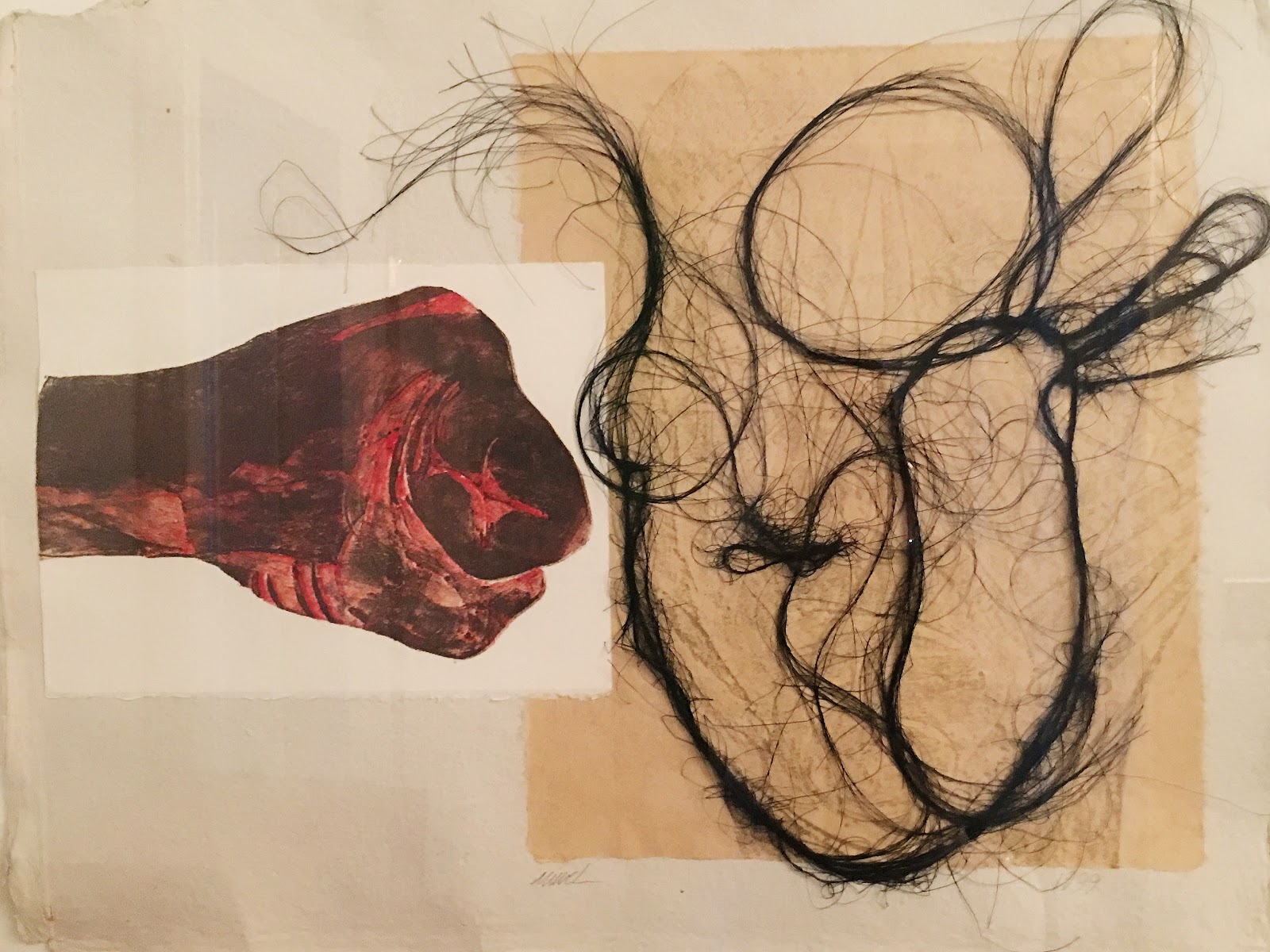10/6/17
The
birds are embodiments of the threatened world of nature and a spiritual aspect
or projection of humans, an alter ego, in a sense: knowing and vulnerable.
- Margaret
Weber
In the over thirty
works by Margaret Weber which are on view at the Drawing Rooms, certain
over-arching themes emerge. Nature, as well as man’s interaction with it, and concerns
over environmental and human destruction predominate. In the first room, a hawk
is hailed as a harbinger, carrying a small human skull on a stem over what
appears to be a deluge. According to the artist’s statement, this series of
intaglio prints from 2013, entitled, Dark
Passage, asks a question: “Will nature carry on despite human destruction?”
The question is even more poignant now that politicians and corporations do not
even acknowledge the effects of global warming and the fact that it is largely
caused by human destruction and pollutions. Weber titled her 2013 catalog,
published by Victory Hall Press, “Birds of Pray,” turning the usual predatory
birds—hawks, falcons, owls— into prophetic seers of human destruction, while
still holding out a hope for some force behind man, a divine force, delivering
us from ourselves.
Birdcage
Birds are part of
several recurring motifs throughout this modest, yet thought-provoking retrospective
exhibition - dedicated to Weber, who unfortunately passed away last year due to
cancer. Since Weber moved to Jersey City from New York City in the early 1970s,
she completed both undergraduate and graduate studies in Fine Art at the Jersey
City State College (now New Jersey City University), and taught art at Jersey
City’s public schools for nearly three decades. Because of her devotion to art
education and art advocacy for the emerging artists’ community in Jersey City
(including co-founding of Drawing Rooms), she is honored by this posthumous
exhibition.
The Flea and The Mortal
Painting, Collage, and Intaglio, 2007
Weber repeated her
favored motifs, of birds, birdcages, helicopters, and various body parts because
she ran an intaglio studio and was able to utilize the same intaglio plates to
create multiple impressions. She would often cut out her prints and collage
them with found paper, textile, feathers, and other materials. In one of the
largest works in the exhibition, a diptych entitled, Song of Icarus, helicopters emerge out of the body of a
goddess-like figure who has actual bird feathers for hair, while a large hawk
covered with human hair is falling into the ocean as Icarus did in the Greek
myth. By exchanging some of human characteristics with those of a bird, Weber
sought to evoke both the “bond and rupture” between human and animal nature. (Weber,
p. 46). By creating a warm tonality of bright colors in this diptych, however,
she embedded elements of hope in an otherwise fatalistic scene.
Double Feathered Eye
Weber’s interest in
Greek myths and her ability to connect them to contemporary social and
political concerns recalls Nancy Spero and her drawings/collages. Like Spero,
some of Weber’s work centered on the symbolism of female bodies, visualized as
fragmented body parts. Mixing personal and political concerns echoed the
strategy of the feminist art movement as well. A couple of her works also
contain the motif of fists, expressing the power to resist and fight. An
exhibition like this will hopefully inspire younger audiences who are
distraught in the current political climate to find their own voices and the
means by which to express them.

Red Fist
Reference: Margaret
Weber, Birds of Pray (Jersey City:
Victory Hall Press, 2016).
Honoring Margaret: The Work of Margaret Weber, 9/22/17 - 11/11/17, features drawing, collage and prints by Margaret Weber. The exhibit is curated by Anne Trauben.
Midori Yoshimoto is Gallery Director and Associate Professor of Art History at New Jersey City University. Read more about Midori here.
Midori Yoshimoto is Gallery Director and Associate Professor of Art History at New Jersey City University. Read more about Midori here.





No comments:
Post a Comment